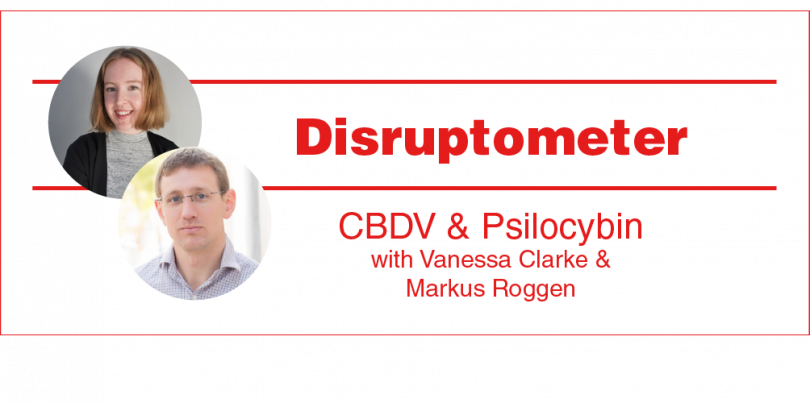From cannabis to psilocybin, DELIC Labs describes their journey into the realm of psychedelic mushroom chemistry.
Sometimes, cannabis is a gateway drug—and in the case of chemical research, that might not be a bad thing. Our research with cannabis served as a training ground to get us ready to work with psilocybin mushrooms. In 2018, we started as a contract research organization under the name Complex Biotech Discovery Ventures (CBDV) with the aim of working on under-researched and controlled botanicals. We began with cannabis, as it was part of an emerging industry with increasing market demand and lots of potential for scientific discovery.
Specializing in cannabis extraction optimization, chemical process development, and analytical testing helped us to accomplish two things: 1) We became experts in cannabis science. The methods we developed and insights gained helped our clients solve challenging problems and pushed the boundaries of scientific knowledge. 2) We became experts in the logistics of working with controlled botanicals.
To do the research on cannabis, we built a laboratory with safety protocols and facility upgrades in place to legally research other highly restricted substances. For example, we implemented many different standard operating procedures and have stringent recordkeeping processes that track samples from when the substance enters the lab to when it is destroyed. In addition to security cameras and alarms, we have a safe bolted to the lab floor where we distinguish psilocybin storage from cannabis storage by keeping the psilocybin in a separate lockbox. Therefore, all our work with cannabis primed us to be able to begin research on other substances as well.
We became interested in mushrooms when we noticed a buzz around psychedelic wellness and psilocybin in particular. With a legal framework emerging in Canada and decriminalization in parts of the USA, companies started to reach out to us about psilocybin research. We realized that our underlying processes and expertise enable us to fill the current research gaps that hamper further scientific progress in the psilocybin industry. [1,2]
At the beginning of 2020, Canada’s regulations had progressed to a point where we could apply for a psilocybin license to start analytical research. Shortly after, we received the license; a psychedelic wellness-focused company, DELIC Holdings, acquired us, and we became DELIC Labs. This partnership provides us with access to the larger resources needed to conduct fundamental research into both cannabis and psychedelic mushrooms.
From a scientific perspective, much of the work that we have done with cannabis translates into the psilocybin mushroom space. For example, we have worked on understanding [3] and monitoring [4] cannabinoid decarboxylation. The decarboxylation reaction, in which a tetrahydrocannabinolic acid, or THCA, molecule ‘loses’ a carbon dioxide (CO2) molecule to form the intoxicating delta-9-tetrahydrocannabinol (THC) molecule, is arguably the foundation of the cannabis industry. As it turns out, this is the similar type of process by which psilocin, the psychedelic compound derived from psilocybin mushrooms, is formed. The key difference is that the loss involves a phosphate group as opposed to CO2. This loss of a phosphate is caused by either acid or base in a hydrolysis, opposite to the heat-mediated decarboxylation for cannabinoids. Therefore, you can expect kinetic studies of this transformation from us in the near future.
Not everything is the same between cannabis and psilocybin. Psilocybin is water soluble, which will delight all the people that have tried bitter cannabis drinks. The bitter taste comes from the emulsions needed to bring THC or cannabidiol (CBD) into the beverage. [5] However, not all is easy if psilocybin and psilocin are water soluble. As mentioned above, psilocybin is labile to acid and base, and psilocin is susceptible to oxidation due to the phenolic hydroxy group and discoloration. [6] Therefore, we will need formulations to protect the valuable ingredients, which might bring us right back to emulsions. Overall, there is a lot of room for experimentation, research, and analysis.
Cannabis was our first stop into the realm of highly restricted botanicals before embarking into the psilocybin space. We adapted much of our former scientific expertise and analytical processes with cannabis to research psilocybin mushrooms. Because these botanicals are both controlled and stigmatized substances, there is still so much to discover, and we are ready to lead in this space. As DELIC Labs, we will continue to bring precision chemistry and collaborate with other scientific experts to advance production and knowledge in the psychedelic wellness industry.
Dr. Markus Roggen
Founder and CEO of Complex Biotech Discovery Ventures
Dr. Markus Roggen’s latest project, Complex Biotech Discovery Ventures, is a fundamental research laboratory and CRO for the cannabis, hemp, and psychedelic mushroom industries. His research interests lie in metabolite composition and behavior throughout the production cycle, extraction optimization, and development of innovative therapeutic formulations. Dr. Roggen received his M/Sci degree from Imperial College, London, UK in 2008. He then pursued his graduate degree in organic chemistry at the Federal Institute of Technology in Zürich (ETHZ), where he received his PhD in 2012. Dr. Roggen was awarded a DAAD postdoctoral fellowship to pursue further training in physical organic chemistry at The Scripps Research Institute in La Jolla from 2013-2014. He then entered the cannabis industry, at first as laboratory director for Davinci Laboratories of California, an analytical laboratory from 2014 to 2016. In 2016, he moved into an executive position overseeing production, R&D, and process optimization for OutCo, a vertically integrated cannabis company. Dr. Roggen is also a trusted advisor and mentor to multiple startups, startup accelerators, and organizations. Positions include advisory positions at Bloom Automation, a cannabis robotics company, and former SAB member at MediPharm Labs, a Canadian LP, and co-chair of the NCIA Scientific Advisory Committee.
Vanessa Clarke
Communication & Multimedia Associate at Complex Biotech Discovery Ventures
With a background in communication and fine arts from Simon Fraser University, Vanessa uses digital media to craft inspiring stories that chronicle the impact of CBDV’s research in the cannabis and psilocybin space. She is motivated by her intellectual curiosity to explore the limitless potential of the emerging psychedelic wellness industry.
References
[1] Kargbo RB. Psilocybin therapeutic research: The present and future paradigm. ACS Med Chem Lett. 2020;11(4):399-402. [journal impact factor = 3.975; times cited = 3][2] Griffiths RR, Johnson MW, Carducci MA, et al. Psilocybin produces substantial and sustained decreases in depression and anxiety in patients with life-threatening cancer: A randomized double-blind trial. J Psychopharmacol. 2016;30(12):1181-1197. [journal impact factor = 3.121; times cited = 407]
[3] He W, Foth P, Roggen M, et al. Why is THCA decarboxylation faster than CBDA? An in silico perspective. 2020; ChemRxiv. Preprint. https://doi.org/10.26434/chemrxiv.12909887.v1
[4] Roggen M, Marelli A, Townsend D, Bohman A. Optimization of the decarboxylation reaction in cannabis extract. Perkin Elmer application note. 2018.
[5] Thurgood J, Martini S. Effects of three emulsion compositions on taste thresholds and intensity ratings of five taste compounds. Journal of Sensory Studies. 2010;25(6):861-875. [journal impact factor = 2.780; times cited = 22]
[6] Lenz C, Wick J, Braga D, et al. Injury-triggered blueing reactions of psilocybe “Magic” Mushrooms. Angew Chem Int Ed Engl. 2020;59(4):1450-1454. [journal impact factor = 12.959; times cited = 4]








